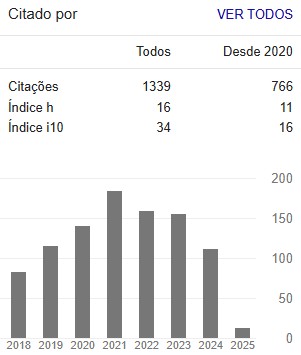The effect of virtual reality-based therapy on dynamic balance training of individuals after stroke
Abstract
The aim of this study was to analyze the effect of virtual reality-based (VR) therapy on balance training of patients after stroke. 10 hemiparetic participants received twelve individual physical therapy sessions using the VR therapeutic, through Nintendo Wii® Fit Plus and Wii Sports Resort™. The analysis revealed that the Dynamic Gait Index (DGI) instrument, responsible for evaluating the dynamic balance, obtained significant difference (p=0.0085) between the basal (17.30±3.59) and final (20.30±2.94) evaluation. The Penguin Slide game had no significance between the scores (p=0.918), but there was a moderate correlation between the DGI instrument (r=0.662; p=0.037). This study obtained favorable results related to dynamic balance and also suggests that VR therapy as in general influenced the improvement of dynamic balance in individuals with hemiparesis after stroke.
Downloads
Downloads
Published
Issue
Section
License
Os artigos submetidos à revista Colloquium Vitae estão licenciados conforme CC BY-NC-ND. Para mais informações sobre essa forma de Licenciamento, consulte: http://creativecommons.org/licenses/by-nc-nd/4.0/.
A disponibilização é gratuita na Internet, para que os usuários possam ler, fazer download, copiar, distribuir, imprimir, pesquisar ou referenciar o texto integral dos documentos, processá-los para indexação, utilizá-los como dados de entrada de programas para softwares, ou usá-los para qualquer outro propósito legal, sem barreira financeira, legal ou técnica.

